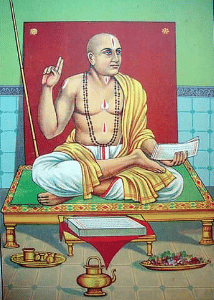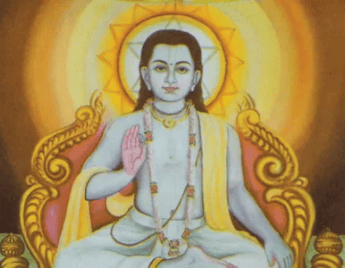UPSC Exam > UPSC Notes > History Optional for UPSC > Philosophy: Madhva and Brahma-Mimansa
Philosophy: Madhva and Brahma-Mimansa | History Optional for UPSC PDF Download
Introduction

Madhvacharya and the Dvaita School of Vedanta
- Madhvacharya was a prominent figure in the 13th century who founded a sect within Vaishnavism based on the Bhagavat Purana.
- Born in Kalyanapur, near Udipi in South Kanara, he initially studied advaita philosophy but later diverged from it.
- After becoming a sanyasi and earning the title Purna Prajna(fully enlightened), he engaged in a debate in Trivandrum against an acharya from Sringeri, which led to his persecution.
- He traveled extensively in North India, faced numerous challenges, and eventually reached the Himalayas, where he wrote a commentary on the Vedanta Sutras.
- Upon returning to Udipi, he established a temple dedicated to Krishna and dedicated the rest of his life to preaching.
- He authored commentaries on the Upanishads and a companion volume to the Mahabharata, which holds significance for the Madhva community.
- Madhva’s teachings emphasized bhakti(devotion) to Krishna, with no place for Radha. He revered all avatars of Vishnu, worshipped Shiva, and recognized the five gods of the Smartas.
- He developed the philosophy of Dvaita(dualism) as opposed to Shankara’s Advaita(monism) and Ramanuja’s Vishishtadvaita(qualified monism).
- Madhva proposed five eternal distinctions:god and individual soul,god and matter,individual soul and matter,one individual soul and another, and one material thing and another.
- He taught that Atman(individual soul) and Brahman(ultimate reality, God Vishnu) are fundamentally different, with the individual soul dependent on Brahman but never identical to it.
- Madhva’s theistic dualism contrasted with the nondualism of Advaita and the qualified nondualism of Vishishtadvaita.
- He criticized the teachings of Adi Shankara and Ramanuja, asserting that liberation is attainable only through God's grace.
- The Dvaita school he founded significantly influenced Vaishnavism, the Bhakti movement in medieval India, and became one of the three major Vedanta philosophies alongside Advaita and Vishishtadvaita.
Question for Philosophy: Madhva and Brahma-MimansaTry yourself: Which philosophy did Madhvacharya develop as opposed to Shankara's Advaita and Ramanuja's Vishishtadvaita?View Solution
Nimbarka

Nimbarka: A Contemporary of Ramanuja
- Nimbarka, a scholarly Raghava Telugu Brahmin from Nimbapura in Bellary district, was a younger contemporary of Ramanuja. He spent much of his time in Brindavan, Northern India.
- In his religious beliefs, Nimbarka emphasized the doctrine of surrender (prapatti) and transformed it into a profound devotion to Krishna and Radha. For him, Radha was not just Krishna's favorite mistress but his eternal consort, residing with him forever in Goloka, the higher heaven.
- Philosophically, Nimbarka advocated the concept of "bheda-bheda," which posits that God, the soul, and the world are both identical and distinct.
- He became the founder of a new sect known as the Sanak sect or Hansa sect, which was allied to but distinct from Ramanuja's teachings.
- Nimbarka expounded his views in a commentary on the Vedanta Sutras and in another work called Siddhantaratna or Dasaloki.
The document Philosophy: Madhva and Brahma-Mimansa | History Optional for UPSC is a part of the UPSC Course History Optional for UPSC.
All you need of UPSC at this link: UPSC
|
367 videos|995 docs
|
Related Searches





















